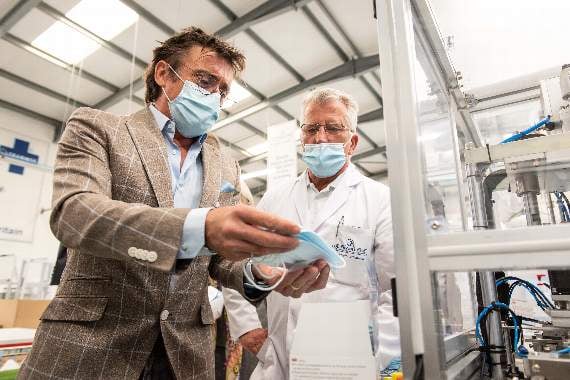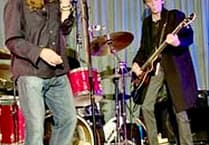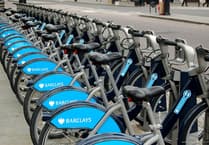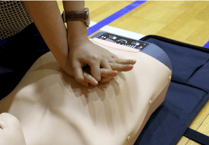GRAND Tour presenter Richard Hammond has helped officially launch a new town-based business that makes a million medical-grade face masks a day.
Set up by the Ross-on-Wye-based Kronsbein family at the town’s Alton Business Park, Ultrafilter Medical has joined the frontline in the fight against Covid while also boosting British manufacturing.
It will ultimately employ 90 local people, including many who lost their jobs in the pandemic and have disabilities.
Mr Hammond, who lives in nearby Weston-under-Penyard and is a volunteer bike rider with the Wye Valley Health Trust’s ’Pharmy Army’ delivering vital medical supplies, joined Herefordshire’s Lord Lieutenant, Edward Harley OBE, and members of the Herefordshire Business Board at last week’s official launch.
The factory is the brainchild of managing director Dustin Kronsbein, and his father and chairman, Dean Kronsbein, who is one of Britain’s leading technology entrepreneurs having spent the last 20 years building an international group of companies specialising in the manufacture of high-efficiency filters for the removal of bacteria and viruses.
With a £3.6m investment from the Kronsbeins, Ultrafilter Medical has established the factory by transforming warehouses on Alton Business Park into a state-of-the-art facility, equipped with mask manufacturing machines designed by its own engineers who are specialists in filtering airborne viruses.
Continues on Page 9
The company currently employs 67 people manufacturing the Ultramask, a Type IIR medical face mask currently being used in hospitals, care settings, the pharmaceutical, food and beverage industries across Europe and in the UK.
Dean Kronsbein said: "At the start of the pandemic, when PPE was in short supply in the UK, we asked ourselves how we could use our wealth of experience in filtering airborne viruses to help save lives and make the UK independent of overseas mask imports.
"I wanted to help my country, it was a call of duty. We also wanted to create much-needed employment and career opportunities for local people here in Ross-on-Wye."
Since opening, the Ross-on-Wye site and its sister factory in Germany have produced more than 400 million masks, used by frontline workers in Herefordshire and further afield, including employees of the Wye Valley NHS Trust, Herefordshire Council, the Swiss Government and hospitals across Germany.
Made with a high-efficiency nanofiber filter media that has been lab tested and certified as having a retention rate of 99.8%, the company says the British-made face mask offers a higher level of protection than the 98% bacterial filtration of many imports currently sold on the high street and being used in the UK.
"This percentage difference may seem small, but when you’re dealing with stopping the penetration of millions of microscopic viruses through a face mask, even a small percentage change in filtration efficiency can be life-saving," said Dean.
The life-saving Ultramask technology is also "more comfortable to wear", thanks to the very fine nanofibers it uses to filter viruses from the atmosphere, which make it easier to breathe while wearing the mask, due to lower differential pressure, he adds.
As it is made in the UK, it has a lower carbon footprint than imported masks from China and other overseas exporters.
And because the Ross-on-Wye factory is producing a million masks a day and offering ’Just-In-Time’ deliveries, orders can be placed by healthcare organisations as and when they are needed.
Frank Myers MBE, Herefordshire Business Board chairman and non-executive director at the Wye Valley NHS Trust, said: "Today’s visit is about thanking the team at Ultrafilter Medical for their hard work and dedication during the pandemic, for the investment in Ross-on-Wye and the employment opportunities it has created.
"It’s also a celebration of British technology and innovation and a local business having a big impact on the lives of so many."
British-born Dean trained and worked as an engineer in Germany before specialising in filtration and moving to Herefordshire.
And flying the flag for UK manufacturing is something the businessman and his family-run global filtration group are passionate about.
"We’re certainly on a mission to bring back manufacturing to Britain. The pandemic has highlighted structural weaknesses in the global supply chain and tariffs and import duties introduced after Brexit are also prompting businesses to think about bringing production home.
"Demand for more sustainability is also playing a big role as the environmental cost of shipping goods from the far east is now being factored in.
"Through face mask production alone, we’ve demonstrated the benefits of British manufacturing for the customer, our local economy and the environment."
The firm hopes to add a third shift swelling the workforce to 90 within a month.
And Dean added: "The majority of those we have employed from here in Ross-on-Wye are from a minority, they have disabilities, these are people that have lost their former jobs in the crisis. It’s extremely rewarding."
GRAND Tour presenter Richard Hammond has helped officially launch a new town-based business that makes a million medical-grade face masks a day.
Set up by the Ross-on-Wye-based Kronsbein family at the town’s Alton Business Park, Ultrafilter Medical has joined the frontline in the fight against Covid while also boosting British manufacturing.
It will ultimately employ 90 local people, including many who lost their jobs in the pandemic and have disabilities.
Mr Hammond, who lives in nearby Weston-under-Penyard and is a volunteer bike rider with the Wye Valley Health Trust’s ’Pharmy Army’ delivering vital medical supplies, joined Herefordshire’s Lord Lieutenant, Edward Harley OBE, and members of the Herefordshire Business Board at last week’s official launch.
The factory is the brainchild of managing director Dustin Kronsbein, and his father and chairman, Dean Kronsbein, who is one of Britain’s leading technology entrepreneurs having spent the last 20 years building an international group of companies specialising in the manufacture of high-efficiency filters for the removal of bacteria and viruses.
With a £3.6m investment from the Kronsbeins, Ultrafilter Medical has established the factory by transforming warehouses on Alton Business Park into a state-of-the-art facility, equipped with mask manufacturing machines designed by its own engineers who are specialists in filtering airborne viruses.
The company currently employs 67 people manufacturing the Ultramask, a Type IIR medical face mask currently being used in hospitals, care settings, the pharmaceutical, food and beverage industries across Europe and in the UK.
Dean Kronsbein said: "At the start of the pandemic, when PPE was in short supply in the UK, we asked ourselves how we could use our wealth of experience in filtering airborne viruses to help save lives and make the UK independent of overseas mask imports.
"I wanted to help my country, it was a call of duty. We also wanted to create much-needed employment and career opportunities for local people here in Ross-on-Wye."
Since opening, the Ross-on-Wye site and its sister factory in Germany have produced more than 400 million masks, used by frontline workers in Herefordshire and further afield, including employees of the Wye Valley NHS Trust, Herefordshire Council, the Swiss Government and hospitals across Germany.
Made with a high-efficiency nanofiber filter media that has been lab tested and certified as having a retention rate of 99.8%, the company says the British-made face mask offers a higher level of protection than the 98% bacterial filtration of many imports currently sold on the high street and being used in the UK.
"This percentage difference may seem small, but when you’re dealing with stopping the penetration of millions of microscopic viruses through a face mask, even a small percentage change in filtration efficiency can be life-saving," said Dean.
The life-saving Ultramask technology is also "more comfortable to wear", thanks to the very fine nanofibers it uses to filter viruses from the atmosphere, which make it easier to breathe while wearing the mask, due to lower differential pressure, he adds.
As it is made in the UK, it has a lower carbon footprint than imported masks from China and other overseas exporters.
And because the Ross-on-Wye factory is producing a million masks a day and offering ’Just-In-Time’ deliveries, orders can be placed by healthcare organisations as and when they are needed.
Frank Myers MBE, Herefordshire Business Board chairman and non-executive director at the Wye Valley NHS Trust, said: "Today’s visit is about thanking the team at Ultrafilter Medical for their hard work and dedication during the pandemic, for the investment in Ross-on-Wye and the employment opportunities it has created.
"It’s also a celebration of British technology and innovation and a local business having a big impact on the lives of so many."
British-born Dean trained and worked as an engineer in Germany before specialising in filtration and moving to Herefordshire.
And flying the flag for UK manufacturing is something the businessman and his family-run global filtration group are passionate about.
"We’re certainly on a mission to bring back manufacturing to Britain. The pandemic has highlighted structural weaknesses in the global supply chain and tariffs and import duties introduced after Brexit are also prompting businesses to think about bringing production home.
"Demand for more sustainability is also playing a big role as the environmental cost of shipping goods from the far east is now being factored in.
"Through face mask production alone, we’ve demonstrated the benefits of British manufacturing for the customer, our local economy and the environment."
The firm hopes to add a third shift swelling the workforce to 90 within a month.
And Dean added: "The majority of those we have employed from here in Ross-on-Wye are from a minority, they have disabilities, these are people that have lost their former jobs in the crisis. It’s extremely rewarding."




